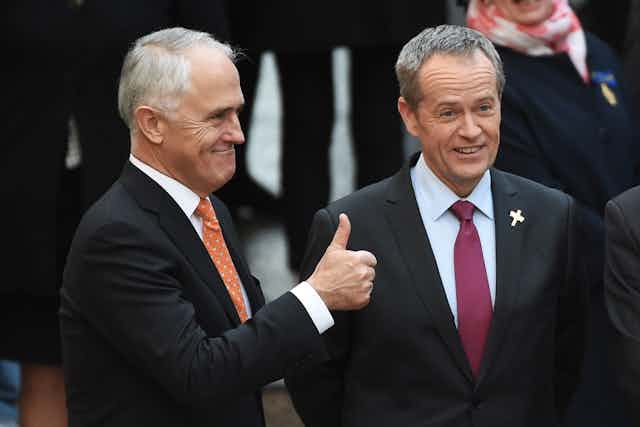2016 was the year of “post-truth” politics, of fake news and “feelpinions”. But while facts may have fallen out of fashion abroad, the popularity of The Conversation’s FactCheck articles show that many Australians still expect and demand their politicians stick to some sort of mutually agreed upon reality.
Bald-faced lies are, thankfully, fairly rare in Australian politics. Being caught in an outright fib or blooper is still seen as shameful. The problem in Australia is that facts and statistics are frequently twisted to paint a misleading picture.
Weasel-words, cherry-picking and overstatements are common. Our politicians and lobby groups are masterful at disguising opinion and ideology as fact, and making statements that, ultimately, aren’t checkable. These tactics are harder to spot, but equally dangerous.
Sometimes FactCheck finds politicians and other public figures to be completely correct. We should recognise and commend leaders who use facts accurately, in context and tell the whole story. That’s when Australians have the best chance of making informed decisions about their country.
2016 was a federal election year in Australia, and our academic experts worked harder than ever during the marathon political campaign. We published 29 Election FactChecks over the eight week campaign, nearly one every two business days – an impressive output from our experts given the rigour of The Conversation’s FactCheck process.

We ask authors to double-check the numbers, scrutinise the fine print, play devil’s advocate, question their assumptions, produce charts, provide links, improve their sourcing, rewrite their copy for clarity – and then all FactChecks are blind reviewed. That means an independent expert academic who doesn’t know the identity of the lead author checks that the story is sound.
Throughout the year, we fact-checked claims about all the key issues making headlines in Australia, and cast a sceptical eye on politicians and public figures of all political stripes. Our Q&A FactChecks, in which we fact-checked comments made on the ABC TV show each week, commanded a large audience.
A few themes came up over and over again: refugees and asylum seekers, welfare reform, the job market, the state of the economy, tax, inequality, energy and the environment to name a few.

You can read a list of our ten best-read FactChecks of 2016 at the end of this article. Some personal favourites that didn’t make the top ten include our 2016 FactCheck Quiz produced by Deputy FactCheck Editor Lucinda Beaman; a FactCheck on the welfare cost and unemployment rate of refugees; a handful of FactChecks on suicide risk; one on how emissions are tracking around the world; a FactCheck on projected climate change refugee numbers; a FactCheck on the “cost” of negative gearing; an evidence-based analysis of whether a vote among under 30s could deliver a Greens prime minister; and a FactCheck on antibiotic overuse in Australia.
FactCheck owes a debt of gratitude to our interns, who pore over transcripts, monitor the media and help track down expert authors to write the FactChecks. A special thanks to Jennifer Cooke, who helped coordinate FactCheck coverage as Deputy FactCheck Editor during the federal election and to the generous 3,500 readers who donated to a crowd-funding effort that allowed Lucinda Beaman to be hired as ongoing Deputy FactCheck Editor.
Most importantly, thank you to all our readers, who believed in 2016 that facts still matter.
Top 10 best-read FactChecks of 2016
FactCheck: Is 30% of Northern Territory farmland and 22% of Tasmanian farmland foreign-owned? By Bill Pritchard, University of Sydney, Erin Smith, University of the Sunshine Coast (reviewed by Jeffrey Wilson).
Election FactCheck: are many refugees illiterate and innumerate? By Georgina Ramsay, University of Newcastle (reviewed by Lucy Fiske).
Election FactCheck Q&A: has the NBN been delayed? By Rod Tucker, University of Melbourne (reviewed by Thas Ampalavanapillai Nirmalathas)
FactCheck Q&A: what are the real numbers on refugees and other migrants coming to Australia? Khanh Hoang, Australian National University (reviewed by Sara Davies)
Election FactCheck: is the Australian Sex Party right about religious organisations, tax and record-keeping? By Bronwen Dalton, University of Technology Sydney (reviewed by Ann O'Connell).
FactCheck Q&A: are one in three age pensioners living under the poverty line? By Rafal Chomik, UNSW Australia (reviewed by Ben Phillips).
Election FactCheck Q&A: is global demand for coal still going through the roof? By Lynette Molyneaux, The University of Queensland (reviewed by John Rolfe).
Election FactCheck Q&A: is it true Australia’s unemployment payment level hasn’t increased in over 20 years? By Peter Whiteford, Australian National University (reviewed by Gerry Redmond).
Election FactCheck Q&A: is Australia among the lowest-taxing countries in the OECD? By Helen Hodgson, Curtin University (reviewed by Kevin Davis).
Election FactCheck: Has the Coalition presided over the most sustained fall in Australian living standards since records began? By Peter Whiteford, Australian National University (reviewed by Roger Wilkins).
You can read all our 2016 FactChecks on our FactCheck page.

